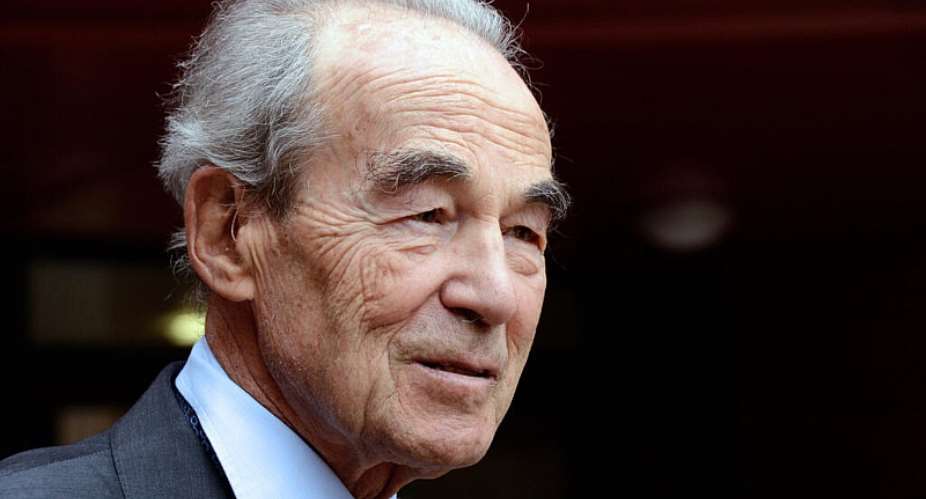Robert Badinter, the former justice minister who played a key role in abolishing the death penalty in France in 1981, has died at the age of 95.
Badinter saved many lives by dedicating his own to the fight against capital punishment.
The soft-spoken human rights lawyer, who said he could not abide by a "killer justice system", was widely vilified for pushing through legislation banning the death penalty at a time when a majority of French people still supported it.
"We entered the court by the front door, and once the verdict had been read and the accused's head was safe, we often had to leave by a hidden stairway," he recalled.
Badinter said later he had "never felt so lonely" in fighting capital punishment, which in France was carried out by beheading with the guillotine – a practice dating back to the French Revolution of 1789.
In years to come, however, he would be hailed for his integrity and statesmanship.
"Robert Badinter never stopped pleading for enlightenment," President Emmanuel Macron wrote on social media platform X.
"He was a person of the century, a man with a republican conscience and a spirit that was French."
'Cut in two'
The son of a Jewish fur trader who died in a Nazi death camp during World War II, Badinter built a reputation as a lawyer for defending – often successfully – notorious cases that his peers didn't dare touch.
His career took a decisive turn in 1972 after one of his clients, Roger Bontems, was beheaded for his secondary role in the murder of a nurse and a guard during a prison escape.
Badinter was haunted by his failure to win a stay on Bontem's execution. The case changed his stance on the death penalty "from an intellectual conviction to a militant passion".
Five years later he helped convince a jury not to execute Patrick Henry for the murder of a seven-year-old boy, becoming a hate figure for many French people.
Badinter turned the case into a trial of the death penalty, calling in experts to describe in grisly detail the workings of the guillotine.
"Guillotining is nothing less than taking a living man and cutting him in two," he argued.
He saved six men from execution during his career, eliciting death threats in the process.
No deterrent effect
Badinter was appointed justice minister in president François Mitterrand's Socialist government in June 1981. He made ending the death penalty an immediate priority.
France's last execution had been in 1977 with the death of Hamida Djandoubi – a Tunisian immigrant convicted of torturing and murdering a young woman.
Just four months after taking office, Badinter ushered an abolition through parliament with a landmark speech denouncing the "stealthy executions at dawn" that were France's "collective shame".
Demolishing myths about the supposed deterrent effect of the death penalty, he argued: "If fear of death stopped men in their tracks, we would have no great soldiers or sporting figures."
Badinter continued to make history in 1983 when he succeeded in getting Bolivia to extradite Klaus Barbie, a former chief of the Nazis' secret police, the Gestapo, to France.
Notorious during the German occupation of France as the "butcher of Lyon", Barbie was put on trial for crimes against humanity and sentenced to life imprisonment in a landmark case that saw Holocaust victims take the stand for the first time in France.
During his five years as minister, Badinter also scrapped a law discriminating against gays on the age of sexual consent and worked to improve conditions in French prisons.
He served as president of the Constitutional Council and as a member of the French Senate from 1995 to 2011.
He worked tirelessly on trying to get a global ban on the death penalty, campaigning against executions in China and the United States.
(with newswires)





 5 Ghanaian MPs safe after being caught in Kenya unrest — Parliament
5 Ghanaian MPs safe after being caught in Kenya unrest — Parliament
 June 26: Rain with occasional thunderstorms to hit most parts of Ghana tonight —...
June 26: Rain with occasional thunderstorms to hit most parts of Ghana tonight —...
 I'm struggling to understand how Akufo-Addo got implicated in SSNIT Hotel sales ...
I'm struggling to understand how Akufo-Addo got implicated in SSNIT Hotel sales ...
 We’ll not be paralyzed by fear of displeasing some people — SSNIT Board Chair
We’ll not be paralyzed by fear of displeasing some people — SSNIT Board Chair
 Kenya's Ruto withdraws finance bill after anti-tax protest deaths
Kenya's Ruto withdraws finance bill after anti-tax protest deaths
 Sale of SSNIT hotels: I expect to be prosecuted if any trace of corrupt practice...
Sale of SSNIT hotels: I expect to be prosecuted if any trace of corrupt practice...
 Process leading to selecting Rock City as preferred bidder was clean, can withst...
Process leading to selecting Rock City as preferred bidder was clean, can withst...
 Bawumia calls on Akufo-Addo; formally informs him of selecting Mathew Opoku Prem...
Bawumia calls on Akufo-Addo; formally informs him of selecting Mathew Opoku Prem...
 Hard working Akufo-Addo surrounded by ‘thieves’ — Osofo Kyiri Abosom
Hard working Akufo-Addo surrounded by ‘thieves’ — Osofo Kyiri Abosom
 Bawumia picks NAPO, submits name as running mate to Akufo-Addo
Bawumia picks NAPO, submits name as running mate to Akufo-Addo
